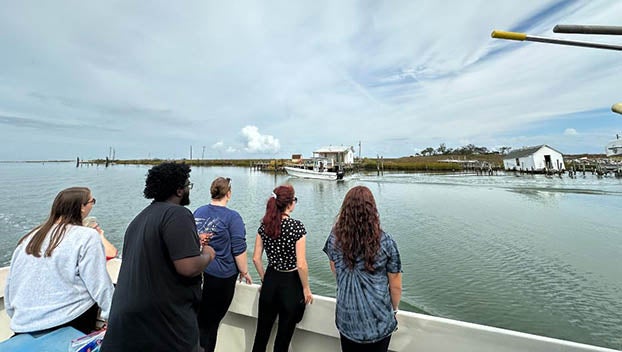Civitae offers unique perspective for Longwood students
Published 8:30 am Sunday, January 7, 2024

- Students get their first look at crab shanties as they arrive at Tangier Island as part of their Citizen 327 field excursion.
|
Getting your Trinity Audio player ready...
|
You could feel the energy as volleys intensified and each side drove points home. It wasn’t an athletics competition, however.
Instead it was a lively, insightful classroom discussion — and a perfect example of how Longwood’s Civitae Core Curriculum is teaching students to think about issues that have serious ramifications and no perfect solutions.
On this day, the topic of discussion was the Chesapeake Bay, the central character in a fall 2023 offering of Citizen 327, Stewardship of Public Waterways. Citizen 327 fulfills a Civitae requirement, and, with its multiday field excursions to the bay, it also is one of Longwood’s signature Brock Experiences.
Chesapeake Bay offers just what faculty teaching these courses are looking for: issues with critical impact on a segment of American society, multiple stakeholders who have passionate — and conflicting — viewpoints, and the opportunity for students to look at their own perspectives through a multifaceted lens and ask questions.
“This class encourages students to think about human use of resources and how we take care of them. What have we done wrong? What can we do right? These are underlying themes for a lot of critical issues in today’s world,” said Dr. Mark Fink, professor of biology, who co-taught the class with Dr. Melissa Rhoten, professor of chemistry. The team also included Dr. Carl Riden, associate professor of sociology.
Many of the 10 students in the class, which met once a week on campus in addition to the field excursions, knew little about the Chesapeake Bay coming into the class.
That included Lyndsey Brown ’24, a theatre education major from Chester.
“While I’ve always been environmentally conscious, I’ve never thought about all the issues happening right in our own backyard,” she said.
That changed with Citizen 327.
On the two field excursions to the bay, Brown and her classmates spoke with watermen whose livelihoods depend on fishing, and they spent two days and nights on Tangier Island, where residents are facing the prospect of sea-level rise/climate change submerging their home in the waters of the bay.
They met with Longwood chemistry alumna Jane Crowther ’81, a senior director at Omega Protein, Inc., a successful business that extracts and refines omega-3 oil from small menhaden fish caught in the bay.
Students also met with the Virginia executive director of the Chesapeake Bay Foundation, who discussed how populations of the bay’s keystone species — menhaden, oysters and blue crabs—have declined over time due to overfishing and deterioration of their environment from pollution and disease. He also described efforts to restore these critical species, which make or break the ecosystems where they live.
On campus, guest speakers included Longwood faculty from different disciplines and the commissioner of the Virginia Marine Resources Commission, who spoke extensively about the regulatory side of fisheries management.
All this and more was on students’ minds as they threw themselves into the final class discussion of the semester in December. Students posed and responded to questions focused primarily on the issues confronting residents of Tangier Island, which was also the focus of the required reading for the course: Chesapeake Requiem: A Year with the Watermen of Vanishing Tangier Island, a New York Times bestseller described as a “soulful portrait” of the 200-year-old Tangier Island crabbing community.
Many differing viewpoints were respectfully expressed. One student, for whom back home is a small town, felt empathy for the 500 island residents and their strong connection to their tiny island home. Another said spending hundreds of millions of taxpayer dollars to counteract the sea-level rise didn’t seem economically feasible or reasonable, especially compared with the costs of relocation.
“This course taught me that you have to look at civic issues from many angles and to have empathy for all sides,” said Brown. “For me, it might be losing a tiny spot of land, but for these islanders it’s their whole life.”
That’s exactly what Rhoten wants to hear.
“The biggest takeaway from this class is to get students to realize that solutions to big problems take a lot of work and a lot of negotiating. You can’t just consider things from one viewpoint. We’re using this class and this set of contentious issues to teach students how they can advocate for a position in whatever environment they find themselves.”



